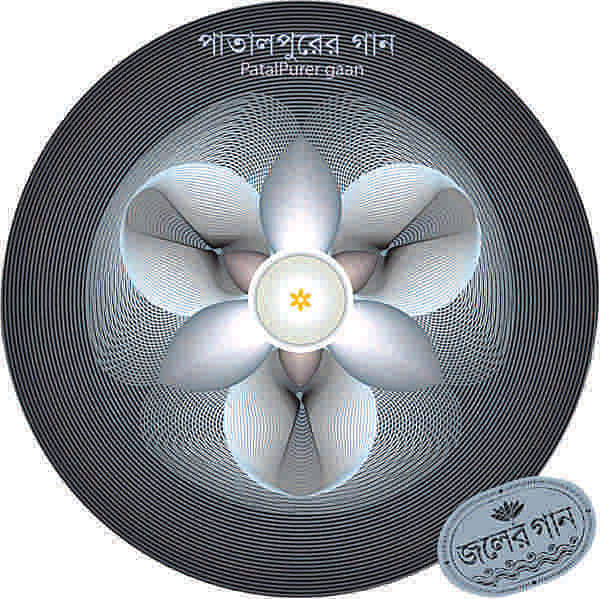Joler Gaan Returns

Joler Gaan has been one of the most popular names in the country's music scene in the past few years, and for good reasons too. Is it the lyrics --- simple, folksy, yet so contemporary? Is it the sound -- standing out with hand-carved instruments? Is it the group's stage presence -- inimitable and unconditionally happy? It's a combination of all that and maybe a few more things. Fans have been eagerly waiting for their new album, and the ensemble did not disappoint. “Patalpurer Gaan” came out on June 1, and features numbers that fans of the band have already heard live, plus a few surprise numbers.
The album opens with “Geetol Chithi”. Instant messaging and social media in everyone's pocket has left this generation oblivious of handwritten letters -- to friends, family and most commonly, significant others. The intimate, romantic song sets the album to a brilliant start, aptly rendered by Kanak Aditya and enhanced by Rahul Anand's silky flute.
If “Geetol Chithi” is for late-night contemplation, “Ek Cup Cha” is the perfect morning song. Rahul Anand weaves a picture of a serene winter morning in a village where life is easy; his theatrical voice just right for this. The staple instrument in this one is the melodica, just light enough for the mood. The use of ambient sounds -- with spoons stirring teacups and friends sitting around a mati'r chula, having a few laughs -- is clever. Jarnal's wacky, elaborate percussion setup gets a good spot too.
“Baula Batash-2” follows, touching the first chords of melancholy in the album. Rahul and Kanak share the verses, alternating between soft and booming. The album, dedicated to all mothers, also has the first connection to the theme, with “O Ganye Aar Jabo Na Ma'go Tomar Choron Chhuye Koi”. Although technically a sequel to the last track of their previous album “Otol Joler Gaan”, there's little resemblance in terms of lyrics or tune.
“Ei Pagol!”, the next track, is probably one of the most-anticipated numbers of the album, already gaining huge popularity at live performances. Romance oozes out of every bit of this song, with lovely violin pieces, Rahul Anand's uninhibited vocals, and Rana Sarwar holding the beat on the cajon.
“Ghum Bhangania Gaan” is more traditionally folk-flavoured than the others, with the flute-mandira-violin combo setting off the groove. ABS Xem sings this one, featuring a tight-packed instrumental arrangement and a droning chorus. Probably not the most memorable track of the lot.
“Ponkhiraaj” is the only instrumental track of the album. With the number of instruments at the band's disposal (Rahul Anand's personal collection is literally in the thousands), an instrumental number was very much expected. Set to a trotting horse's hooves, the track is uplifting, with fine transitions in between. It's one of those tracks that grow on you with each listen.
“Pakhi'r Gaan”, the next in queue, is another of Joler Gaan's old numbers, and has been on their live set-list almost always. Kanak Aditya's voice returns after a hiatus, with the raw, rural tone that he does so well; Rahul Anand's modola plays a few sweet pieces. The percussion tag-team of Rana, Shyamol and Jarnal do a fantastic job on this one.
“Ekaki Ashor” is a testament of versatility of the band. Part of the soundtrack of an upcoming film, it is very jazzy, Western -- with the use of the clarinet, and Rahul Anand in a whole new diction and vocal projection. Sanjay, the Chandravaan (the band's custom upright bass) player is one of the heroes of this song, holding the groove effortlessly.
“Andhar Raite” is next; the bhatiali-like number is easily the standout for me. Yearning, sorrow and emptiness is something Joler Gaan has an immaculate grip on. This song delivers that and then some. Kanak Aditya pours in all the emotions that this song can handle, and the interludes are one better than the other. One song that can get (and most probably already has) stuck in a loop in your head.
“Aar Nai Keu”, the next song, sounds like straight out of a horror movie. Based on a Jibanananda Das poem, it has a more urban sound. Rahul Anand shows yet another side to his vocals: eerie and somewhat intimidating. The arrangement is almost orchestral, with guitar and crash cymbals and a whispering backing vocal.
The album closes with “Noisshobde Dheu”, a one-minute ambient track with sound of winds and waves and heartbeats.
For any band, it's often hard to live up to the expectations after a hugely successful first album. And with a band that has amassed such popularity in such a short time, it is probably even harder. Considering the album came at an interval of less than 14 months, Joler Gaan has done a commendable job at delivering what their fans have been demanding. The mixing and mastering is brilliant (even in the presumably-compressed free online stream), and there really is nothing to complain about.

 For all latest news, follow The Daily Star's Google News channel.
For all latest news, follow The Daily Star's Google News channel. 



Comments